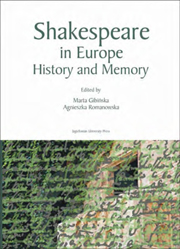Book contents
- Frontmatter
- Contents
- Preface
- Towards a European History of Henry V
- History and Histories
- History and Memory: Criticism and Reception
- History, Memory, and Ideological Appropriation
- Theatre: The Act of Memory and History in the Making
- Shakespeare Remembered by his Stuart Successors: Reflections on the 2005 “Gunpowder Season” at the Swan Theatre in Stratford
- “Who's there?” – Macbeth on the London Stage 2004–2005
- Stillness in Hamlet
- “Blood Sprinkled or Blood Spilt:” the History of Richard II Revisited in the Contemporary Theatre
- The Memory of Architecture: New Thoughts on Reconstructing old Theatres (The Case of the Gdańsk Fencing School)
- Index of Authors
Shakespeare Remembered by his Stuart Successors: Reflections on the 2005 “Gunpowder Season” at the Swan Theatre in Stratford
from Theatre: The Act of Memory and History in the Making
Published online by Cambridge University Press: 05 September 2014
- Frontmatter
- Contents
- Preface
- Towards a European History of Henry V
- History and Histories
- History and Memory: Criticism and Reception
- History, Memory, and Ideological Appropriation
- Theatre: The Act of Memory and History in the Making
- Shakespeare Remembered by his Stuart Successors: Reflections on the 2005 “Gunpowder Season” at the Swan Theatre in Stratford
- “Who's there?” – Macbeth on the London Stage 2004–2005
- Stillness in Hamlet
- “Blood Sprinkled or Blood Spilt:” the History of Richard II Revisited in the Contemporary Theatre
- The Memory of Architecture: New Thoughts on Reconstructing old Theatres (The Case of the Gdańsk Fencing School)
- Index of Authors
Summary
In the summer of 2005 the RSC, after what had seemed to me like a couple of decades of under-achievement, emulated its headiest days of the 1960s. It used dramatic texts not only to entertain the punters but also to explore the condition of England. Forty years ago the strategy of the company was to produce Shakespeare in Stratford while mounting seasons of contemporary and experimental drama at the Aldwych Theatre in London. In 2005, as in 2003 when there was a season of little-known Renaissance plays at the Swan, two theatres were used strategically: a (notable) season of comedies was running at the Main House while, at the Swan, Associate Director Gregory Doran put together and oversaw, under the umbrella title of “The Gunpowder Season,” a programme of history and problem plays by Shakespeare's contemporaries and successors.
The year 2005, of course, marked the four hundredth anniversary of the Gunpowder Plot when the Roman Catholic Robert Catesby, with a group of followers who included Guy Fawkes, tried to blow up King James and the Houses of Parliament: the amount of gunpowder they had amassed, had it gone off, would have created the first act of terrorism in modern times, designed not only to kill the king but also to destabilize the country. Three of the RSC's “Gunpowder” plays attracted the attention of the censor: reflecting upon this anniversary and seeing them as a group has confirmed my working assumption that much of the drama of the period does not simply moralise insurrection and its outcomes but problematises a perception of autocracy that was the inevitable concomitant of an emerging modern state and a consequence of religious factionalism.
- Type
- Chapter
- Information
- Shakespeare in EuropeHistory and Memory, pp. 265 - 276Publisher: Jagiellonian University PressPrint publication year: 2008



